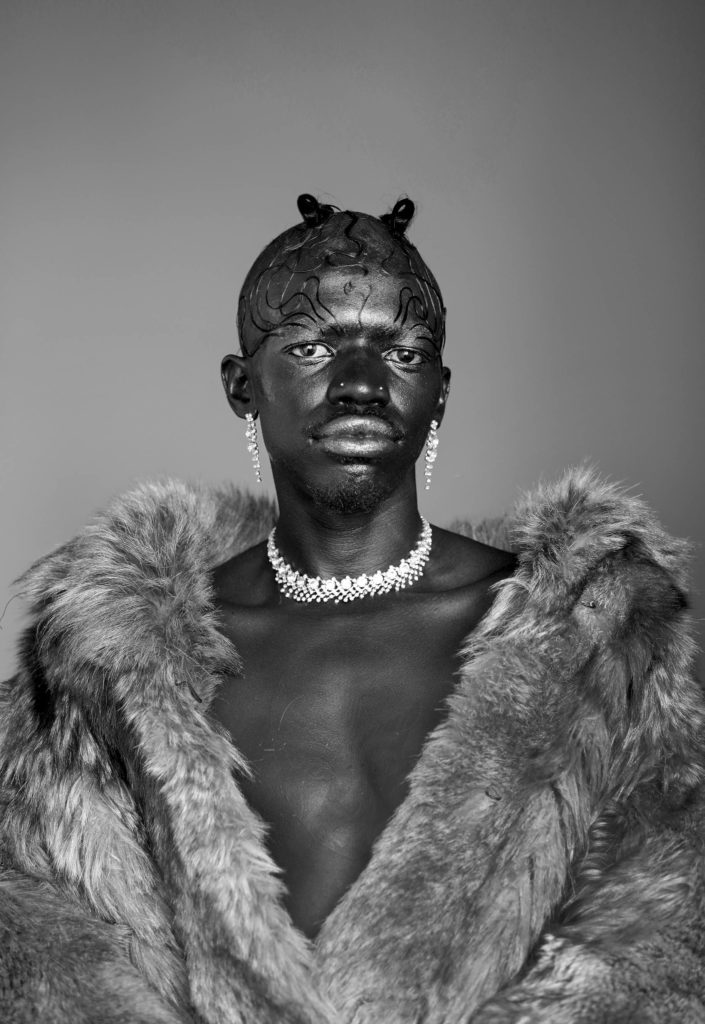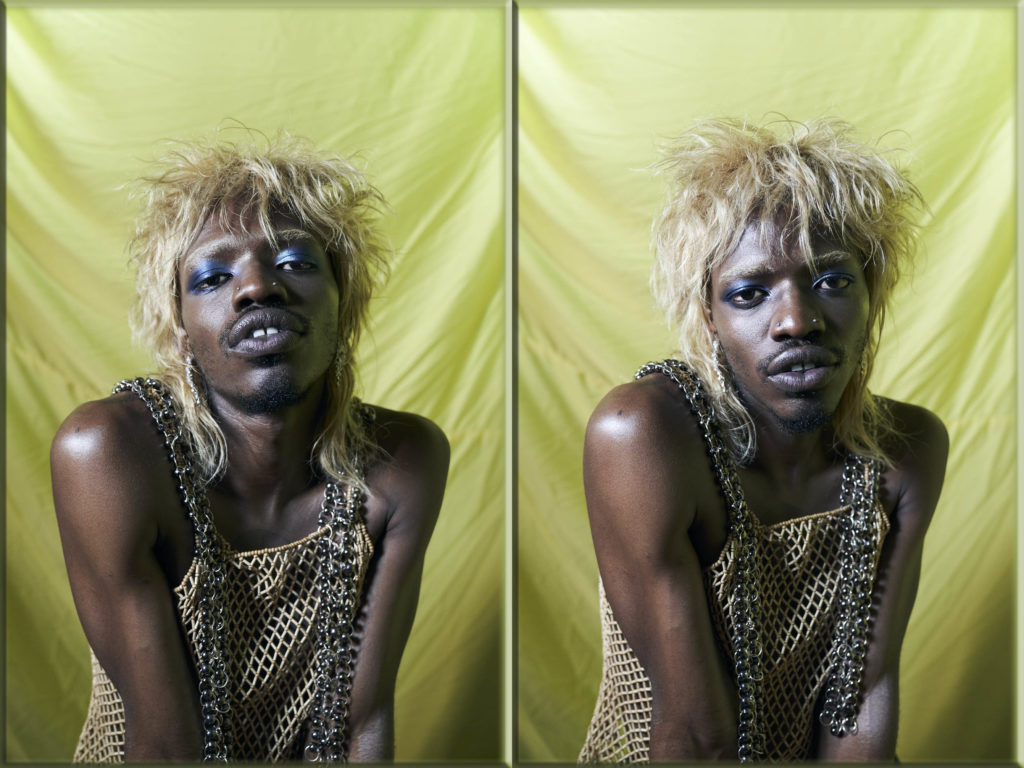Desire Marea (Image by Zanele Muholi: Duma in Black & White )
Desire Marea is no longer in Johannesburg. After living and working in the city for the past five years, the artist recently moved back to KwaZulu-Natal where they were raised.
The news is delivered to me in a whisper at the beginning of our telephonic date to speak about their solo EP, Desire. “A lot is happening today. I think there’s also a purge going on with my respiratory system because I have a sinus infection,” Desire sniffs before explaining their voluntary repatriation.
At face value, the relocation was encouraged by Desire’s need to break away from a practice that was becoming too dependent on Johannesburg and a need to cut down on living expenses. Even though FAKA was on tour for most of 2019 the artist says there were almost no returns from that. “It’s sad that [queer folk] come secondary to everyone else. It also makes it very hard to earn a decent living,” Desire sighs.
Before finalising their decision to leave the city, they quit their nine to five as a copywriter and put whatever resources they had left into creating Desire. “I had to do this,” they say before letting out a sigh. “As soon as I finished putting the project together I came home and a few days later I lost my grandfather.”
Even though this proved to be enough of a reason for them to come home, upon deeper introspection, Desire found that at the basis of their relocation was the heightened sense of displacement that they were beginning to feel in Johannesburg. “I was feeling like my internal experience was one that alienated me so much because I didn’t have the vocabulary to express why Jo’burg had become so exhausting and so lonely,” they explain. During this time they used music to journal their slow exit from the city and packaged it into Desire.
The album was released on January 10, the same day as the new decade’s first full moon and lunar eclipse. “I released it today for a reason: the moon is in my sign, Cancer. It’s a marker of change, a rebirth,” explains Desire.
All in all, putting the EP together took a year. Between 2012 and 2017 Desire occupied themself with creating their own sonic identity. And even though it happened habitually, the words that they wrote, the beats that they made and the songs that they recorded were kept away from public consumption. The focus was FAKA. But after losing a hard drive that had more than 100 unreleased or unfinished songs early in 2018, Desire “realised how valuable those projects were and it kind of gave me a new sense of urgency”.
So they got to work, rewriting from memory and salvaging what they could find on other USBs, computers and drives. They then invited a number of songwriters, producers, audio engineers, vocalists, instrumentalists and a photographer to work on Desire.
“They came in magical ways; I didn’t have to sit down and heavily curate,” Desire says when asked about those who contributed to the EP. The total number adds up to 12 artists including Craig Hawkins, Nonku Phiri and Gyre. The album’s cover art was shot by Sir Zanele Muholi.
 (Sir Zanele Muholi)
(Sir Zanele Muholi)At its core the end product explores the duality that comes with existing. Through the songs’ cohesive and related plots, Desire demonstrates how pain, fear, abundance, lack, joy, love and courage can exist in the same place at the same time. In their personal life Desire takes this on by carrying the gratitude of international recognition and the opportunity to tour the world while navigating queerphobia, objectification and living with a chronic disease.
An example where the battle of contrasting sentiments is demonstrated is the album’s breakout single, You Think that I’m Horny. The song questions the way in which queer folk are often hypersexualised outside and in the lesbian, gay, bisexual, transgender, queer and intersex (LGBTQI+) community.
The song explores the romantic displacement that comes with being attracted to someone in a manner that goes far beyond the physical attraction. Desire addresses a suitor saying: “You think that I’m horny/ Baby you arouse me/ But I don’t wanna fuck you/ I just wanna be with you.” The artist finds that these feelings are displaced because of how the cis-heteronormal world has conditioned themselves and the LGBTQI+ community to view queer folk as beings who are led by their sexual desires. “We’re not seen holistically and that kind of thing is often used to invalidate us.”
Having said that, Desire is firmly of the belief that the reclamation of queer sensuality is a valid tool for activism because it’s where “people learn how to navigate sex and set boundaries for themselves”.
 (Jamal Nxedlana)
(Jamal Nxedlana)Describing what genre the music belongs to presents a problem. Although it’s easier to place Desire in the electronic music category, the artist prefers to think of it as fluid, non-conforming world music that was made with healing in mind.
The music looks to heal by encouraging the listener to “develop a new way of listening and experiencing music”, one that asks the listener to “trust their primal instinct”. Instead of overly analysing the words and their meaning (as this review is doing), Desire urges listeners to “be aware of their bodies while they listen to the music” because there’s an opportunity of healing in how the music permits the body to let go.
To administer this healing, the artist makes use of the sounds made by voices and instruments. Desire’s voice is a choral vibrato that is at times reminiscent of church choruses and on other occasions takes the listener on an operatic journey. With regard to the beats, it’s almost as if the artist was working toward giving the listener their interpretation of a sonic tour through celestial and ancestral planes. This allows every song to pour into the next one to create one solid soundscape.
Intermission of independence
 (JiaLiang Zhong)
(JiaLiang Zhong)Desire Marea is one half of FAKA. Since 2015, the duo has kicked cis-heternormative ass through a multidisciplinary practice that worked at normalising queerness through provocative music, fashion, dance and installation. Together Desire and Fela Gucci have given us a soundtrack for South African queerness and an online community in which to find queer solace. Their influence not only saw Donatella Versace inviting them to a show, but she asked for their permission to use their music as the score to Versace’s spring/summer 2019 fashion show in Milan. They walked so that South African queer artists such as Gyre, Angel-Ho, Umlilo, Mx Blouse and K-$ could fly.
After presenting their artistry as a duo for four years, Desire decided to go solo.Taking its first steps alongside the debut album is Desire’s record label, Izimakade Records. “I spent the entire year trying to connect to labels that released things that sounded similar. None of them really got back to me so I created my own home,” they explain.
Izimakade Records will also be releasing work by Sanele Ngubane and Neo Hlasko Mahlasela in 2020.
FAKA remains unharmed by Desire going solo because they believe that an intermission of independence is necessary for the sustenance of a long-term collaboration. “When you are a part of something that is as powerful as FAKA, some of the things that form a part of your individual artistry can be neglected,” admits Desire. — Zaza Hlalethwa